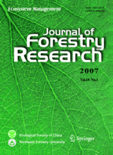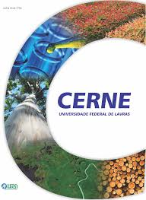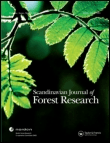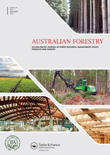
JOURNAL OF FORESTRY RESEARCH
Scope & Guideline
Exploring the depths of ecological innovation.
Introduction
Aims and Scopes
- Forest Ecology and Biodiversity:
Research on the ecological dynamics, species interactions, and biodiversity within forest ecosystems, including studies on tree species composition, plant-animal interactions, and the impacts of climate change. - Forest Management and Conservation:
Studies focused on sustainable forestry practices, forest management strategies, and conservation efforts aimed at preserving forest ecosystems while meeting economic needs. - Forest Health and Disease:
Research on the health of forest ecosystems, including studies on pests, diseases, and the effects of environmental stressors on tree species and forest health. - Climate Change Effects on Forests:
Investigations into how climate change influences forest dynamics, including tree growth, carbon sequestration, and forest resilience. - Technological Advancements in Forestry:
Research incorporating technology, such as remote sensing, machine learning, and IoT applications, to enhance forest management and monitoring. - Forest Products and Utilization:
Studies related to the economic aspects of forestry, including wood properties, biomass utilization, and the sustainability of forest products.
Trending and Emerging
- Machine Learning and Data Analysis in Forestry:
The application of machine learning techniques to analyze forest data, predict growth patterns, and enhance forest management practices is increasingly prominent, reflecting a trend towards data-driven decision-making. - Climate Resilience and Adaptation Strategies:
Research focusing on how forests can adapt to changing climate conditions, including studies on species resilience, adaptive management practices, and restoration strategies, is gaining traction. - Urban Forestry and Green Infrastructure:
As urban areas expand, studies examining the role of urban forests in ecosystem services, public health, and community well-being are becoming more frequent, highlighting the importance of integrating forestry into urban planning. - Forest Ecosystem Services Valuation:
An increasing number of studies are focusing on quantifying and valuing the ecosystem services provided by forests, such as carbon sequestration, water regulation, and biodiversity conservation. - Ecophysiological Responses to Environmental Stressors:
Research on how trees and forest ecosystems respond physiologically to environmental stressors, such as drought, pollution, and pests, is emerging as a critical area of study.
Declining or Waning
- Traditional Timber Management:
Research focusing solely on conventional timber management practices has decreased, as the field shifts towards more integrated and sustainable approaches to forestry that consider ecological impacts. - Single Species Studies:
There is a notable reduction in studies that focus exclusively on single tree species, with a growing emphasis on community-level interactions and ecosystem-based research. - Historical Dendrochronology:
While still relevant, the frequency of studies using traditional dendrochronological methods to analyze historical tree growth patterns has declined in favor of more contemporary approaches that integrate climate data and advanced modeling.
Similar Journals

ANNALS OF FOREST SCIENCE
Bridging Research and Practice in Forest ConservationANNALS OF FOREST SCIENCE, published by Springer France, stands at the forefront of ecological research, contributing significantly to both the fields of Ecology and Forestry, as evidenced by its prestigious Q1 ranking in both categories for 2023. Since its inception in 1999, this journal has become an essential resource for academics, practitioners, and students who are eager to explore the complexities of forest ecosystems and their interactions with global environmental changes. With an ISSN of 1286-4560 and E-ISSN 1297-966X, it disseminates cutting-edge research and critical reviews that enhance our understanding of forest science. Although it does not offer open access, the journal continues to be a pivotal platform for presenting innovative scientific findings that address the pressing challenges of forest management and conservation. Its significant impact factor reflects the high-quality contributions that have made a lasting mark on the discipline.

Cerne
Exploring Innovations in Forest Management and BiodiversityCerne is a distinguished open-access journal dedicated to advancing knowledge in the field of forestry, published by the Universidade Federal de Lavras (UFLA). Since its inception in 1994, the journal has actively contributed to the global discourse on sustainable forest management and biodiversity conservation, presenting research findings that are both relevant and impactful. With its ISSN 0104-7760, Cerne aims to foster collaboration among researchers, professionals, and students, enhancing the understanding of forestry practices in Brazil and beyond. As of 2023, it holds a respectable Q3 ranking in the forestry category, further cementing its position within the academic community, illustrated by a Scopus ranking of #97 out of 174 in the Agricultural and Biological Sciences - Forestry field. Operating under an open-access model allows for wide dissemination of research outputs, ensuring that critical findings reach a broad audience, fueling further innovation and discovery in the field. With converged years extending from 2007 to 2024, Cerne continues to be a vital resource for anyone engaged in forestry research and practices.

SCANDINAVIAN JOURNAL OF FOREST RESEARCH
Innovating Research for Forest Conservation and ManagementSCANDINAVIAN JOURNAL OF FOREST RESEARCH, published by Taylor & Francis AS, is a leading peer-reviewed journal dedicated to advancing knowledge in the field of forestry. With an impressive ranking of Q2 in the Forestry category for 2023 and a Scopus rank of #57 among 174 journals in Agricultural and Biological Sciences, this journal serves as a vital resource for researchers, professionals, and students. Its broad scope encompasses various aspects of forest research, including ecology, management, and conservation, making it indispensable for those involved in the sustainable stewardship of forest resources. The journal is available through subscription, ensuring high-quality research dissemination while maintaining rigorous academic standards. With continuous publication from 1986 to the current year, it stands as a significant contributor to the global conversation on forest science, highlighting the importance of forest ecosystems in ecological and socio-economic contexts.

FOREST SCIENCE
Exploring innovative solutions for ecological challenges.FOREST SCIENCE, published by Oxford University Press Inc, is a pivotal journal in the field of forestry and ecological modeling, boasting an impressive track record since its inception in 1970. With an ISSN of 0015-749X and E-ISSN 1938-3738, the journal provides a valuable platform for the dissemination of high-quality research and studies that address contemporary challenges in forestry and ecology. It ranks in the Q2 category for both ecology and forestry and holds a Q3 ranking in ecological modeling according to the latest evaluations, illustrating its significant contribution to these fields. The journal is accessible through various options, facilitating broad readership and engagement within the academic community. As part of its commitment to advancing knowledge and practices in forest management and conservation, FOREST SCIENCE seeks to bridge theoretical research with practical applications, making it an indispensable resource for researchers, professionals, and students alike.

AUSTRALIAN FORESTRY
Cultivating a Deeper Understanding of ForestryAustralian Forestry is an esteemed journal dedicated to advancing knowledge in the field of forestry and related environmental science. Published by Taylor & Francis Australia, this journal plays a pivotal role in disseminating high-quality research that spans various aspects of forestry, including sustainable management, conservation practices, and policy analysis. With an impact factor reflecting its significance in the academic community and a Scopus rank of #44 out of 174 in the category of Agricultural and Biological Sciences, Australian Forestry proudly holds a Q2 ranking in its field as of 2023. The journal has maintained a continuous publication record since its inception in 1936, with a commitment to addressing contemporary challenges within forestry. Researchers, professionals, and students alike are invited to engage with this vital resource that fosters insightful dialogue, innovative solutions, and a deeper understanding of forestry science.

FORESTRY
Innovating practices for a thriving forest ecosystem.FORESTRY is a prestigious journal dedicated to the advancing knowledge and innovative practices in the field of forestry, published by Oxford University Press. Established in 1927, it encompasses a rich history of scholarly contributions and has evolved to maintain its relevance, addressing contemporary issues and research in forestry and related disciplines. With an impressive Q1 ranking in the category of Forestry, this journal holds a notable position within the Scopus rankings, being placed 20th out of 174 in the Agricultural and Biological Sciences domain, highlighting its significant impact with an 88th percentile standing. Researchers, professionals, and students can access critical insights into forestry management, ecology, and policy, facilitating informed decision-making and fostering sustainable practices. While Open Access options are currently not available, the journal's rigorous peer-review process ensures the publication of high-quality research that contributes both to academic advancement and practical applications in forestry worldwide. The comprehensive coverage from 1927 to 2024 makes FORESTRY an invaluable resource for anyone invested in enhancing the field of forestry.

EUROPEAN JOURNAL OF FOREST RESEARCH
Innovating Solutions for Sustainable Forest ManagementThe European Journal of Forest Research (ISSN: 1612-4669; E-ISSN: 1612-4677), published by Springer, stands at the forefront of advancing the field of forestry and plant sciences. With a distinguished reputation reflected in its Q1 category rankings in both Forestry and Plant Science for 2023, this journal excels in disseminating high-quality research that addresses the critical challenges facing forest ecosystems across Europe and beyond. Established in Germany, the journal has transitioned through various phases since its inception in 1996, striving to integrate innovative research findings that promote sustainable forest management and conservation strategies. As part of a rich academic tradition, it boasts a commendable ranking within the Scopus database, placing it in the top echelons of its category. Researchers and practitioners alike can benefit from its commitment to open access options, ensuring that cutting-edge studies are accessible to a global audience. The European Journal of Forest Research serves as an essential platform for knowledge exchange, aiming to enhance the understanding of forest dynamics and improve the management of forest resources in the face of a changing climate.

BOSQUE
Fostering Dialogue for Environmental ProgressBOSQUE, published by Universidad Austral de Chile, Facultad de Ciencias Forestales, stands as a pivotal platform for advancing the field of forestry and related environmental sciences. With an ISSN of 0717-9200, this journal has been committed to disseminating original research, reviews, and case studies essential for understanding forest ecosystems and management practices since its inception in 2006. As of 2023, it holds a Q3 ranking in the forestry category, showcasing a significant yet developing influence in the broader academic landscape, evidenced by its Scopus ranking placing it at the 12th percentile in Agricultural and Biological Sciences - Forestry. While boasting a diverse range of articles, BOSQUE promotes open access to a growing community of researchers, professionals, and students eager to contribute to sustainable forest management and conservation efforts. The journal continues to foster critical dialogue and innovation, making it an invaluable resource for those dedicated to enhancing forest sciences.

Madera y Bosques
Connecting Research with Real-World ImpactMadera y Bosques is a prominent academic journal specializing in the fields of forestry and wood science, published by INST ECOLOGIA A C in Mexico. With an ISSN of 1405-0471 and an E-ISSN of 2448-7597, it has established itself as a vital platform for disseminating research findings, innovative practices, and methodologies pertinent to sustainable forest management and ecological conservation. Operating since 2008, the journal covers a wide scope of topics related to the complexities of forest ecosystems, the importance of biodiversity, and the challenges posed by climate change. Despite its categorization in Q4 for the year 2023 in the Forestry category, Madera y Bosques aims to elevate discourse and practice in the field, providing a voice to emerging researchers and seasoned professionals alike. Additionally, the journal adheres to open access principles, enhancing the visibility and accessibility of its articles to a global audience. Researchers and practitioners are encouraged to engage with its rich content to further their understanding and impact in the world of forestry.

CANADIAN JOURNAL OF FOREST RESEARCH
Advancing knowledge in forestry and ecological sciences.Canadian Journal of Forest Research (ISSN: 0045-5067, E-ISSN: 1208-6037), published by Canadian Science Publishing, stands as a leading platform for disseminating cutting-edge research in the field of forestry and ecological sciences. With an impressive impact factor and a steady reputation for high-quality publications, this journal occupies a prestigious position indicated by its Q1 ranking in Forestry and Q2 in Ecology as of 2023, alongside commendable placements in global and planetary change studies. Covering a broad scope from sustainable forest management to the impacts of climate change on forest ecosystems, the journal encourages submissions that address contemporary challenges and innovations in forest research. Operating from its base in Ottawa, Canada, the Canadian Journal of Forest Research has been a cornerstone of academic discourse since 1974, offering researchers and professionals vital access to pioneering studies that inform policy and practice in forestry. Researchers, educators, and students alike will find this journal an indispensable resource for advancing knowledge and fostering collaboration in the vital realm of forest research.